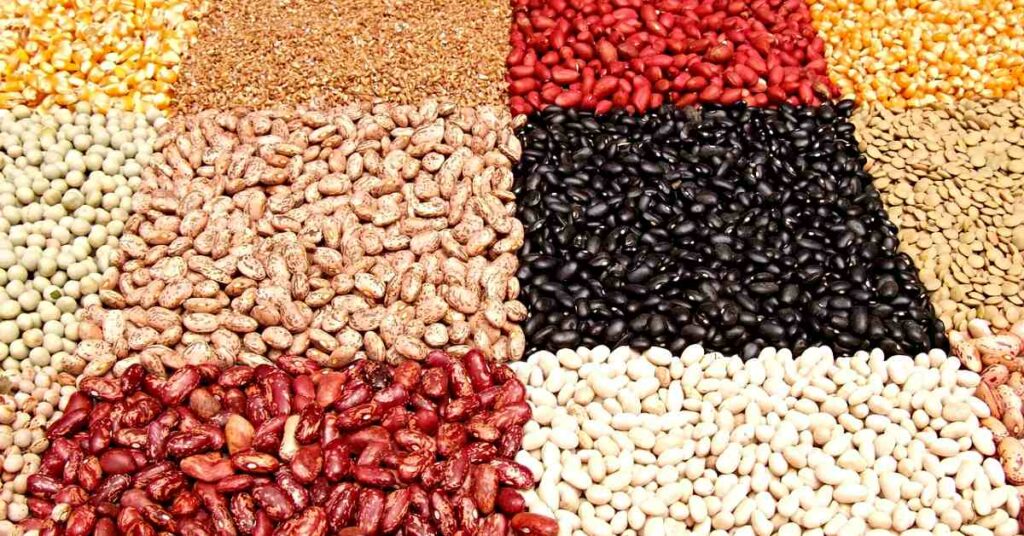The Mediterranean diet is renowned for its focus on wholesome, nutrient-rich foods that promote overall health and well-being. It emphasizes the consumption of plant-based foods, including a variety of fruits, vegetables, whole grains, legumes, and nuts, which provide essential vitamins, minerals, and fiber. Healthy fats, particularly olive oil, are a cornerstone of the diet, offering heart-healthy monounsaturated fats and antioxidants.
The diet also encourages moderate consumption of fish and poultry, which are excellent sources of lean protein and omega-3 fatty acids. Unlike diets high in red meat and processed foods, the Mediterranean diet is associated with a lower risk of chronic diseases and is considered a sustainable and flavorful approach to eating that can be enjoyed by people of all ages.
How Much Protein On Mediterranean Diet?
As for the amount of protein you should eat on the Mediterranean diet, it generally aligns with the recommended dietary allowance (RDA) for protein, which is 0.8 grams of protein per kilogram of body weight per day for the average adult. However, individual protein needs can vary based on factors such as age, sex, activity level, and overall health.
Several factors can influence how much protein a person needs, and it’s important to adjust one’s diet accordingly to meet these individual requirements. Age is a key factor, as older adults may need more protein to help preserve muscle mass and strength, as well as to support overall health. The recommended dietary allowance (RDA) for protein is 0.8 grams per kilogram of body weight per day for adults, but older adults may benefit from 1.0 to 1.2 grams per kilogram per day.
Gender also plays a role, with men generally requiring more protein than women due to their typically larger body size and higher muscle mass. However, individual protein needs should be based on specific body composition and activity level rather than gender alone.
Body Mass Index (BMI) is another consideration, as individuals with a higher BMI may require more protein if their weight is due to muscle mass. However, if the higher BMI is due to excess body fat, protein needs may not be significantly higher. It’s important to consider body composition rather than relying solely on BMI.

The level of physical activity also affects protein requirements, with people who are physically active, especially those who engage in resistance training or endurance sports, having higher protein needs to support muscle repair, growth, and recovery. Athletes or individuals who engage in regular intense exercise may require 1.2 to 2.0 grams of protein per kilogram of body weight per day.
Health status is another factor that can influence protein needs. Certain health conditions, such as chronic kidney disease, may affect protein requirements. Also, individuals with specific health concerns, such as diabetes, should consult with a healthcare professional or a registered dietitian to determine their optimal protein intake.
To adjust one’s diet appropriately based on these factors, it’s important to monitor protein sources, balance meals, consider protein timing, and adjust portions. Including a variety of protein sources in the diet, such as lean meats, poultry, fish, dairy products, legumes, and plant-based proteins like tofu and tempeh, is essential.

Aim for balanced meals that include a source of protein, whole grains, healthy fats, and plenty of fruits and vegetables. Distributing protein intake evenly throughout the day, such as including a source of protein with each meal and snack, can help support muscle synthesis and overall health.
Depending on individual needs, portion sizes of protein-rich foods may need to be adjusted, especially for athletes or individuals engaging in resistance training who may require larger portions to meet their higher protein needs. Consulting with a healthcare professional or a registered dietitian is always advisable to determine personalized protein needs and to ensure that dietary adjustments are appropriate and healthy.
Protein Ideas For Mediterranean Diet
It is a misconception to believe that it is difficult to get enough protein on the Mediterranean diet. Like other primarily plant-based diets, the Mediterranean diet protein options are many, and they can be full of flavor.
Here’s a breakdown of the primary sources of protein in the Mediterranean diet:
- Legumes: Beans, lentils, chickpeas, and peas are excellent sources of plant-based protein and are commonly used in Mediterranean dishes like hummus, falafel, and various stews and salads.
- Fish and Seafood: The diet encourages the consumption of fish and seafood at least twice a week. Fatty fish like salmon, mackerel, sardines, and tuna are particularly valued for their high omega-3 fatty acid content.
- Poultry: Chicken and turkey are included in moderation, usually grilled, baked, or stewed with herbs and vegetables.
- Dairy: Greek yogurt, feta cheese, and other dairy products provide protein as well as calcium and probiotics. Dairy is typically consumed in moderate amounts.
- Nuts and Seeds: Almonds, walnuts, pistachios, and seeds like flaxseeds and chia seeds are not only good sources of protein but also healthy fats.
- Eggs: Eggs are a versatile protein source in the Mediterranean diet and can be used in various dishes, from breakfast to salads.

Protein On Mediterranean Diet – The Benefits!
Dietary protein plays a crucial role in maintaining and building lean muscle mass, which is essential for overall health and functionality, especially as we age. Here are some key points on how dietary protein helps in retaining lean muscle mass and extending the number of active healthy years in the elderly population:
- Muscle Protein Synthesis: Dietary protein provides the essential amino acids needed for muscle protein synthesis, the process by which the body builds and repairs muscle tissue. This is particularly important as muscle mass naturally declines with age, a condition known as sarcopenia.
- Preventing Muscle Loss: Adequate protein intake can help slow down the rate of muscle loss associated with aging. This is important for maintaining strength, mobility, and independence in the elderly population.
- Recovery and Repair: Protein aids in the repair of tissues damaged by wear and tear, injury, or surgery, which is crucial for maintaining an active lifestyle.
- Metabolic Health: Protein has a higher thermic effect than carbohydrates or fats, meaning it requires more energy to digest and metabolize. This can contribute to maintaining a healthy metabolism and body composition.

To further improve strength and vitality as we age, in addition to maintaining a balanced diet rich in protein, the following steps can be taken:
- Regular Exercise: Engaging in regular physical activity, including both aerobic and resistance training, is essential for maintaining muscle mass, bone density, and overall fitness.
- Adequate Nutrition: Along with protein, ensuring a balanced intake of vitamins, minerals, probiotics, and other nutrients is crucial for overall health and well-being.
- Hydration: Staying well-hydrated supports physical performance, digestion, and overall health.
- Quality Sleep: Getting enough quality sleep is important for recovery, hormonal balance, and cognitive function.
- Stress Management: Managing stress through techniques like mindfulness, meditation, or yoga can help maintain mental and emotional well-being.
- Regular Health Check-ups: Regular check-ups with healthcare professionals can help monitor and manage health conditions that may impact strength and vitality.
By combining adequate protein intake with these lifestyle factors, older adults can improve their chances of maintaining strength, mobility, and independence as they age.
Challenges of Getting Enough Protein on the Mediterranean DIet
One of the challenges of getting enough protein on the Mediterranean diet is its emphasis on plant-based foods, which may lead to lower protein intake compared to diets that include more animal-based products. While legumes, nuts, and seeds are good sources of protein, they may not provide as much protein per serving as meats, poultry, and fish. As a result, individuals following the Mediterranean diet need to be mindful of including a variety of protein-rich plant foods and incorporating moderate amounts of fish and poultry to meet their protein needs.
Another challenge is the potential for inadequate protein intake in older adults or individuals with higher protein requirements, such as athletes or those engaged in resistance training. These groups may need to pay extra attention to their protein intake to ensure they are consuming enough to support muscle maintenance and overall health.
This might involve incorporating the occasional use of protein supplements, if necessary, and regularly monitoring protein intake to make adjustments as needed.
Best Protein Powder for Mediterranean Diet
Maintaining muscle health is crucial for overall well-being, but it’s important to be mindful of the sources of protein we consume. Some animal-based proteins can raise levels of pro-aging hormones like IGF1, potentially speeding up the aging process and increasing the risk of chronic diseases, including cancer.
ProLon’s L-Protein offers a carefully crafted solution with its plant-based protein blend, enriched with essential vitamins and minerals. This unique formulation is designed to provide the right amount of protein while keeping IGF1 levels in check, supporting muscle health without compromising longevity.
L-Protein is the first of its kind, a precision beverage patented for promoting a longer, healthier life. It’s entirely vegan and crafted to help you balance muscle strength with your longevity goals.
Key Features of ProLon L-Protein
- Controls Pro-Aging Factors: formulated from legumes to control pro-aging factors like IGF1
- High Protein, Low Carbohydrate: includes 25g of protein per serving, and all essential amino acids and is low in carbohydrates
- 21 Vitamins and Minerals: sourced directly from fruits and vegetables
- Clean Ingredients: vegan, gluten-free, lactose-free, soy-free, and silica-free
- Muscle Support: supports the maintenance and growth of muscle and lean body mass
- Meal Replacement: Perfect post-fast recovery, weight control and your busy life
- Weight Management / Healthy protein levels help maintain a healthy weight
Think L-Protein might be for you?
Click the button to learn more about preserving your lean muscle mass!
Protein On Mediterranean Diet – Conclusion
While the Mediterranean diet is lauded for its numerous health benefits, ensuring adequate protein intake can sometimes be a challenge, especially for individuals with higher protein needs, such as athletes or older adults.
This diet emphasizes plant-based foods and moderate consumption of fish and poultry, which can make it tricky for some people to meet their protein requirements. Additionally, the reliance on plant-based protein sources means that individuals need to be mindful of combining different plant proteins to ensure they are consuming all the essential amino acids their bodies need.
